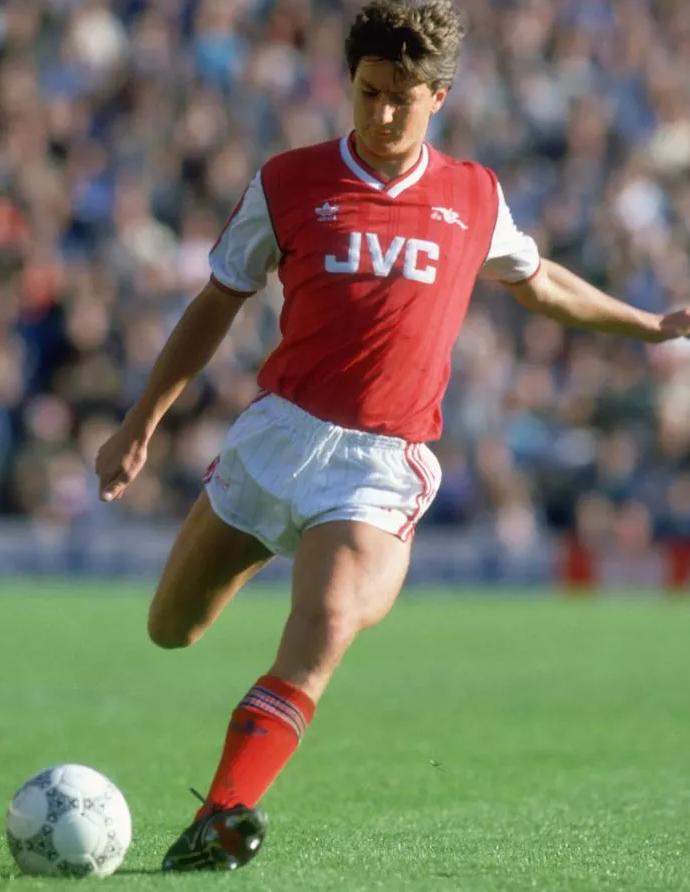
2 minute read
"What Do You Think of Tottenham...?"
from Red & White (1)
by Oscarfw
In the history of Arsenal Football Club, few partnerships have had as profound an impact as the collaboration between the Gunners and sportswear manufacturer Umbro during the 1970s. This chapter explores how this iconic partnership not only shaped Arsenal's identity during that golden era but also set the foundation for the club's future success. The early
1970s marked a turning point for both Arsenal and Umbro. Arsenal, under the leadership of manager Bertie Mee, had experienced a period of relative mediocrity and sought to revitalize the club’s fortunes. Umbro, known for its quality sportswear and innovative designs, was looking to expand its presence in the football market. In 1971, these two powerhouses came together, giving birth to a partnership that would redefine Arsenal’s identity. One of the first significant changes brought about by the
Advertisement
Arsenal-Umbro partnership was the design of the team’s kit. Umbro introduced a bold and modern look, characterized by a prominent white sleeve with a red trim. This revolutionary design became instantly recognizable and resonated with the fans. The iconic Arsenal cannon emblem was prominently displayed on the chest, further solidifying the team’s identity.


“As the ball hit the back of Liverpool's net, George sank to the Wembley turf and lay on his back with his arms outstretched.”
The 1970s marked a period of unprecedented success for Arsenal. Under the stewardship of manager Bertie Mee and the guidance of influential figures like captain Frank McLintock and striker Charlie George, the Gunners achieved remarkable feats. The team clinched their first-ever European trophy, the Inter-Cities Fairs Cup in 1970, followed by their first league and FA Cup double in the 1970-71 season. This success on the pitch helped to forge a winning mentality and a strong sense of identity within the club. The partnership with Umbro extended beyond the football pitch, creating a cultural impact that resonated with fans. The new kit design and the team’s success captured the imagination of supporters, who proudly donned their replica shirts on match days. This sense of unity and identity spread throughout the fanbase, creating a powerful bond between the club and its followers. Arsenal became more than just a football team; it became a symbol of resilience, ambition, and community.



The partnership between Arsenal and Umbro in the 1970s laid the groundwork for the club's future success and continued evolution. The triumphs of that era propelled Arsenal onto the international stage and attracted talented players and managers who would further shape the club's identity. Additionally, the strong bond formed with Umbro set the standard for subsequent partnerships, as the Gunners continued to collaborate with renowned sportswear brands, adapting their kits while staying true to the club's core identity. The partnership between Umbro and Arsenal in the 1970s was a pivotal moment in the club’s history. Through innovative kit design, on-pitch triumphs, and a strong connection with fans, this collaboration helped shape Arsenal’s identity as a formidable force in English football. The legacy of that era continues to inspire and influence the club to this day, as Arsenal strives to uphold its rich heritage while embracing new partnerships and opportunities in an ever-evolving football landscape.



After the successful partnership with Umbro in the 1970s, Arsenal Football Club continued its quest for excellence by forging a new alliance with sportswear giant Adidas in the 1980s. This chapter explores how this collaboration not only shaped Arsenal's identity during a decade of dominance but also laid the foundation for the club's future achievements.
1986-1994
"Graham
Appointed in 1986, Graham brought a tactical discipline and defensive solidity to the team, revolutionizing their style of play. Under his guidance, Arsenal achieved remarkable success and solidified their identity as a resilient and tenacious side. Graham's meticulous approach, attention to detail, and ability to instill a winning mentality within the squad were instrumental in shaping Arsenal's identity during this period.






